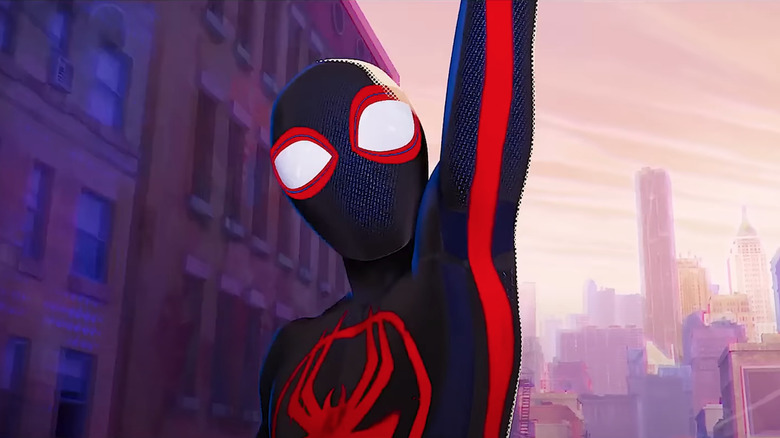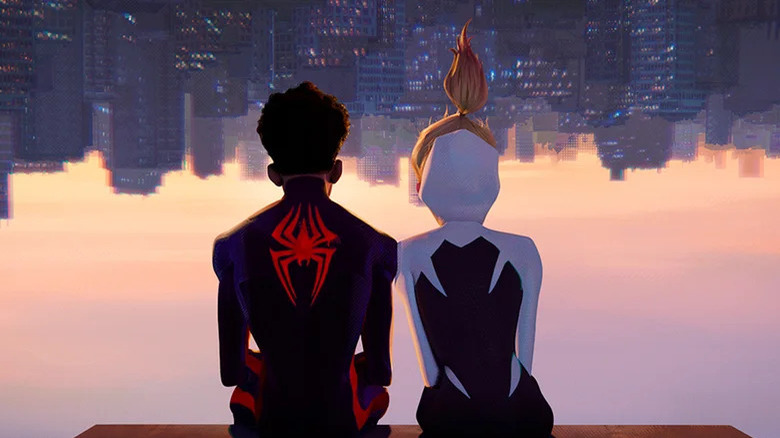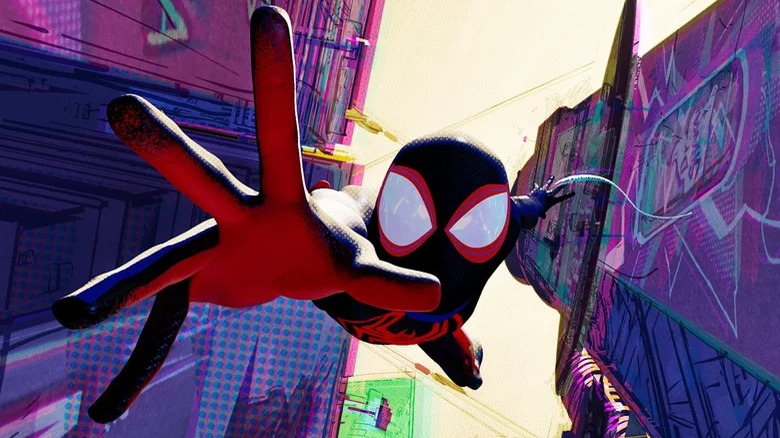Spider-Man: Across The Spider-Verse Was A Nerve-Wracking Process For Its Creators
This article contains major spoilers for "Spider-Man: Across the Spider-Verse."
Following up "Spider-Man: Into the Spider-Verse," considered by many to be the best superhero movie ever made, was never going to be easy. In a sea of bland superhero offerings, 2018's "Into the Spider-Verse" not only managed to stand out as a truly original take on the genre but redefined how studios approached animation going forward.
Now, the dazzling sequel "Spider-Man: Across the Spider-Verse" has arrived and somehow managed to outdo the original, plunging audiences into a multiverse of animated worlds that feel more vibrant and imaginative than anything the MCU has given us for a long, long time. Perhaps ever. Miles Morales (Shameik Moore) is back to lead this vivid adventure through the multiverse, but this time Gwen Stacy (Hailee Steinfeld) is just as important story-wise, making for an impressive weaving of two major storylines that intersect throughout and yet feel distinct in their own right.
This is nothing short of a triumph. Considering the success of the first movie, which made $375 million on a $90 million budget, new directors Joaquim Dos Santos, Kemp Powers, and Justin K. Thompson already faced a mammoth task to match it. But think about everything else they had to contend with: a storyline that incorporates six universes, each with its own distinct and striking art style; a central narrative that has to balance genuine emotional weight with its outlandish and fantastical ambitions; and the burden of not tarnishing the legacy of a movie that came to redefine animation. It's no wonder, then, that Dos Santos, Powers, and Thompson were a little nervous going in.
Across the Spider-Verse is too dark?
"Across the Spider-Verse" has so much going for it, but its visual style and scale are, for me, the best parts. The movie feels huge without compromising the interpersonal drama and heart at the core of Miles' and Gwen's stories. And aside from working in literally thousands of Spider-People from 60 years of Spider-Man history, the story spans six different timelines. Which for three filmmakers in their feature directorial debut, is just a massive thing to take on.
So, to say Santos and his co-directors were nervous going in is somewhat of an understatement. The trio spoke to IGN about their trepidation for "Across the Spider-Verse," revealing some of their specific concerns about the sequel. As Kemp Powers put it, "For me, the biggest nerves I had about it was people saying it was too dark. But that's also necessary, as Justin said, to make people want to go into the next film."
The film certainly isn't entirely light-hearted, with Oscar Isaac's Miguel O'Hara, aka Spider-Man 2099, conveying a genuinely threatening and vampiric aura at various points. Meanwhile, the film's central villain The Spot (Jason Schwartzman) transmogrifies from a wise-cracking "villain of the week" as Miles puts it, into a terrifying vision of anarchy and decay by the film's end. But what Powers seems to be referring to is the twist ending, where Miles believes he's back in his own universe but discovers he's actually been transported to an alternate reality where his father has died and there's a sinister version of himself who's taken on the mantle of the Prowler — the villainous alter ego of his deceased uncle from back in Miles' own timeline. And all while The Spot travels to Miles' actual universe to kill the hero's father. Pretty bleak stuff.
'Trust your gut'
While such a tumultuous and consequential storyline could very well come across as a little much for an animated movie primarily aimed at younger audiences, the Spider-Verse movies have succeeded by not following any rules, in terms of both their visual and storytelling style. Having seen the movie, I didn't necessarily think it was too dark, but it's interesting to hear that Kemp Powers was getting that feedback.
Ultimately, though, as Joaquin Dos Santos told IGN, the directors had to trust their intuitions and believe in the story they were telling. The co-director explained:
"I'd be lying if we didn't say, every decision we make, there's a certain amount of nerves that go into it. You have to, at the end of the day, believe in the art, believe in your decision making, trust your gut. The fact that we've screened this thing a bajillion times, and all that stuff goes into sort of a witch's brew to make our final decisions. But I think it's exciting and ballsy."
The fact that these guys were able to produce such a dazzling, grandiose, and genuinely fun movie with the amount of pressure they were under is seriously impressive. And there's more to come, with "Across the Spider-Verse" forming part one of a two-part story. With this first part proving to be the triumph that it is, Powers, Dos Santos, and Thompson can hopefully await the release of "Beyond the Spider-Verse," which arrives on March 29, 2024, feeling a lot less nervous.


